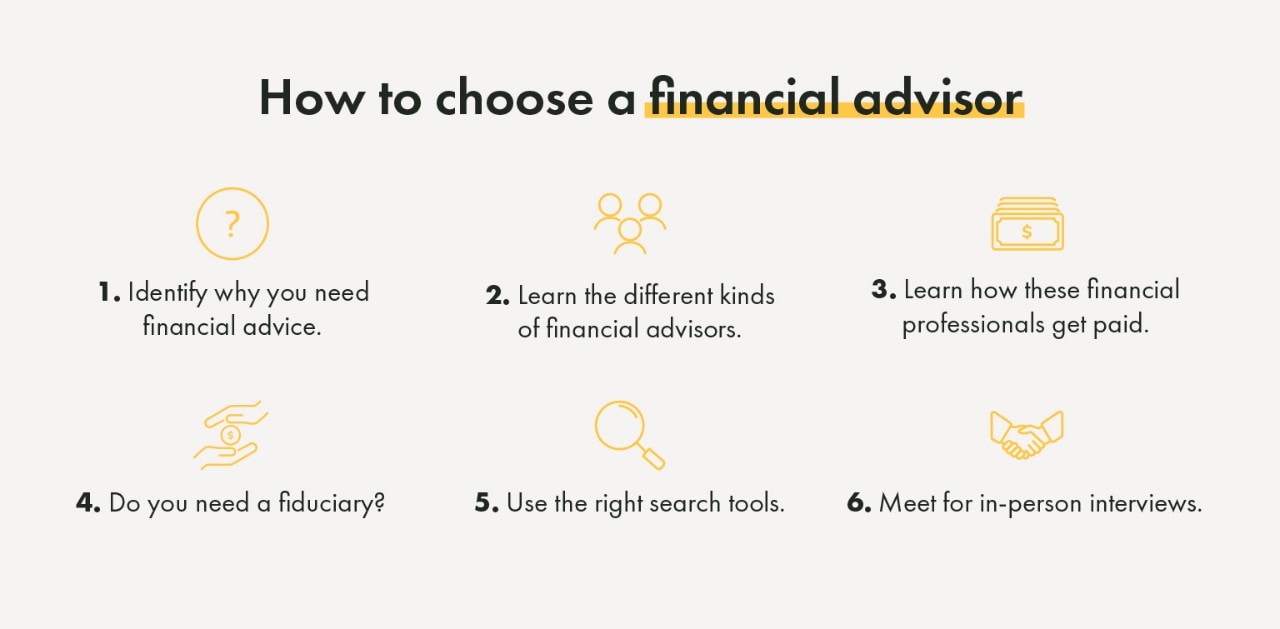- Not insured by the FDIC or any other government agency
- Not bank guaranteed
- Not a deposit or obligation
- May lose value


Many individuals and couples struggle with the decision of whether they can manage their financial situation alone or if they should work with a wealth or financial advisor. Whether because of a life change, unexpected event, or need for general advice, a wealth advisor can help you navigate your full financial picture.
The term “financial advisor” is a catch-all that describes a variety of professionals who provide a range of services. But at its most basic, a financial advisor assists individuals and couples with achieving their financial goals by providing guidance along the way. Advisors will range in the services that are offered and personal interactions you receive. For example, there are robo-advisors that offer automated digital platforms with very little to no human engagement. Others offer full-service investment management services where you partner with a wealth advisor to assess your overall financial situation and discuss strategies to improve your financial health.
Wealth advisors also may assess your current financial situation and guide you toward future goals, develop a comprehensive financial plan, provide advice for unexpected challenges as they occur, manage your investments, or even determine the best financial vehicles for your goals.
Wealth or financial advisors provide advice on everyday issues. In your daily life, they can help you strategize for your financial future and create a goal-oriented plan.
In other cases, wealth advisors can play a role during life changes. Significant life events cause many individuals to seek financial advice. Such events include:
If such a life event is not on your horizon, you may ask yourself why you need a wealth advisor. Especially when financial advice is available in books, cellphone apps, newspapers, and websites, a wealth advisor may seem unnecessary.


However, ask yourself:
Depending on your answers, a wealth advisor can help. Even though you can find financial planning information yourself, a non-biased third party who knows financial regulations and the markets can provide specialized advice.
Working with a wealth advisor can help you achieve your financial goals. Here are some common benefits.
Financial goals vary depending on your stage in life. Whether you seek to increase your retirement savings, improve your investment portfolio, or pay down your mortgage, establishing a detailed plan can help lead you to your goal.
However, sticking to that plan—which usually requires breaking bad habits—is more difficult alone.
According to a 2021 study, 80% of respondents named (1) “developing a holistic personal financial plan” and (2) “regular check-ins on progress toward financial goals” as the biggest benefits of working with a wealth advisor.
Changing bad habits also requires emotional control. Sure, you’ve heard of emotional eating. But are you an emotional spender? Consider how your emotions affect your spending decisions.
Your wealth advisor should become an intimate confidant. They should understand your motivations, how you fit within your family unit, and the lifestyle you hope to achieve.
Just as your wealth advisor will help you develop and stick to a comprehensive financial plan, they will also coach you toward better decision-making skills.
For example, a volatile stock market can affect an investor’s emotions. It is the job of a wealth advisor to remain objective and stay focused on the long term. This helps clients to stay on course to achieving the goals that are set in the financial plan.
The past few years have shown that economic uncertainty is here to stay. With continuing market volatility, your financial plan should account for asset protection.
To protect your assets, you can mix multiple strategies. These include portfolio diversification (i.e., investing in a range of securities, sectors, regions), safe investments (i.e., Treasuries, CDs, and non-correlated assets), and adjust your asset allocation to reduce risk (i.e. 70/30 down to balanced 50/50).
Wealth advisors are more likely to employ multiple asset protection strategies than investors managing on their own.
Wealth advisors can organize your finances and show you a path toward your financial goals. But not everyone will find their services necessary.
Benefits include:
However, a few drawbacks of hiring a wealth advisor include:
Once you’ve determined that you need a wealth advisor, Yellow Cardinal Advisory Group has the experience and specialization to help you meet your goals. Our services include personalized, comprehensive financial planning and wealth management, flexible and holistic investment portfolio construction, retirement planning advice, and much more.
Our financial advising team at Yellow Cardinal is here for you when you’re ready.
Choosing a Financial Advisor graphic: Adapted from “How to Choose a Financial Advisor in 6 Easy Steps in 2022,” by Mallika Mitra and Edgar Nieves, Money.com; https://money.com/how-to-choose-a-financial-advisor/.
The information on this page is accurate as of June 2022 and is subject to change. First Financial Bank and Yellow Cardinal Advisory Group are not affiliated with any third-parties or third-party websites mentioned above. Any reference to any person, organization, activity, product, and/or service does not constitute or imply an endorsement. By clicking on a third-party link, you acknowledge you are leaving bankatfirst.com. First Financial Bank and Yellow Cardinal Advisory Group are not responsible for the content or security of any linked web page.
You are about to go to a different website or app. The privacy and security policies of this site may be different than ours. We do not control and are not responsible for the content, products or services.
Online banking services for individuals and small/medium-sized businesses.
If you haven't enrolled yet, please enroll in online banking.
Yellow Cardinal resources
* Are not insured by the FDIC. Not a deposit. May lose value.
f1RSTNAVIGATOR is where our business clients can access tools to help manage day-to-day account activity.